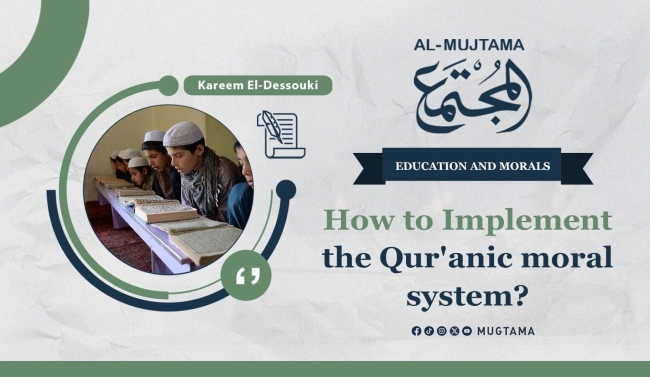How to Implement the Qur'anic moral system?
In an era where the pace of life is accelerating, values are becoming intertwined, and Western civilization is influencing the minds and hearts of billions through its promotional tools, a pressing question arises: How can we apply the Qur'anic moral system in our daily lives? This is not merely a theoretical question but one that lies at the heart of the challenges facing contemporary Muslim societies.
The Qur'anic ethics are not just rigid texts but living teachings that can be applied in every time and place, opening the door to practical strategies for embodying these morals in our modern reality. This includes suggestions made by the late scholar Dr. Yusuf al-Qaradawi in his book “General Characteristics of Islam.”
Al-Qaradawi emphasizes the need to link ethics with daily acts of worship and interactions, a connection that integrates ethics into the daily life of a Muslim rather than keeping them as mere theoretical slogans.
In the same context, the late scholar Dr. Muhammad Imara, in his book “Between Islamic Universality and Western Globalization,” offers a vision for applying Qur'anic ethics in the face of contemporary challenges, affirming that Qur'anic morals provide balanced solutions to the complex ethical issues faced by modern societies by combining constancy in principles with flexibility in application.
In his book “Radical Reform: Islamic Ethics and Liberation,” Dr. Tariq Ramadan proposes an approach based on rereading Qur'anic texts in light of modern realities while preserving the spirit and essence of the text. He views this as a method that can help develop ethical strategies suitable for the complexities of the modern era.
Moreover, Dr. Abdul Karim Bakkar, in his book “Renewing Awareness,” stresses the importance of connecting Qur'anic ethics to contemporary challenges such as environmental issues, technology, and globalization, making Qur'anic ethics more relevant to people's realities and daily challenges.
In the field of education, Dr. Suad Al-Hakim, in her book “Moral Education in Islam,” offers a strategy that integrates Qur'anic ethical concepts into educational curricula in a practical and interactive way, contributing to instilling moral values in the hearts of younger generations.
Surveys align with the Islamic theoretical frameworks regarding the activation of Qur'anic values as the sole means to confront the Western value-based globalization. This movement seeks to dissolve all non-Western cultures into a modernist mold. A study conducted by Al-Azhar University in 2020 revealed that 72% of participants believe that applying Qur'anic ethics can solve many contemporary social issues.
This result reflects an increasing awareness of the importance of Qur'anic ethics in addressing current issues, not just those of heritage and history. This indicates that the Islamic approach does not face a significant challenge in convincing the majority of the audience in our Muslim nation thus far.
In a 2021 study conducted by King Abdulaziz University in Jeddah, a training program based on Qur'anic ethics was applied in several secondary schools, and the results showed a significant improvement in students' ethical behavior by 42% compared to the control group.
Conversely, another survey conducted by the Pew Research Center in 2018 across five Islamic countries indicated that 68% of participants believe there is a gap between Qur'anic moral values and daily practices in their societies, highlighting the urgent need for practical strategies to bridge this gap.
Given this, the effectiveness of educational interventions based on Qur'anic values seems likely to yield positive results in most Arab and Islamic social environments, provided the key weapon underpinning the globalization of Western culture—media, both traditional and social—is used effectively.
A 2019 study by the Arab Center for Research and Policy Studies found that 75% of Arab youth believe that social media can play a positive role in spreading Qur'anic moral values if used correctly.
In this context, Dr. Fahd Al-Hamoudi, in his book “New Media and Ethics” (2020), emphasizes the need to adopt a strategy for spreading Qur'anic moral awareness through social media platforms using attractive and innovative methods aimed at reaching a wide segment of youth who spend considerable time on these platforms.
In our view, implementing the Qur'anic moral system in daily life requires an integrated approach that combines a deep understanding of Qur'anic texts with an awareness of contemporary challenges. This approach should focus on transforming ethical concepts into practical practices in various areas of life through practical strategies, including:
1. Developing interactive training programs that focus on applying Qur'anic ethics in everyday life situations.
2. Creating digital platforms that offer Qur'anic moral content in a modern style that attracts young people.
3. Encouraging community initiatives that apply Qur'anic ethical values in service and development projects.
4. Integrating Qur'anic moral education into curricula in a practical and interactive manner.
5. Organizing community awareness campaigns that highlight the importance of Qur'anic ethics in solving contemporary problems.
However, achieving these strategies requires the concerted efforts of religious, educational, and media institutions, along with active participation from individuals in society. It also requires continuous review and development of methods and means in line with societal and technological changes.
Implementing the Qur'anic moral system in daily life is an ongoing project that requires continuous intellectual and practical effort. It is a challenge that calls for critical and creative thinking on how to embody these values in changing contexts while maintaining their authentic essence. Qur'anic ethics are not just texts to be recited but a way of life that must be translated into tangible reality in our daily lives.
-------------------------------------------------------------


